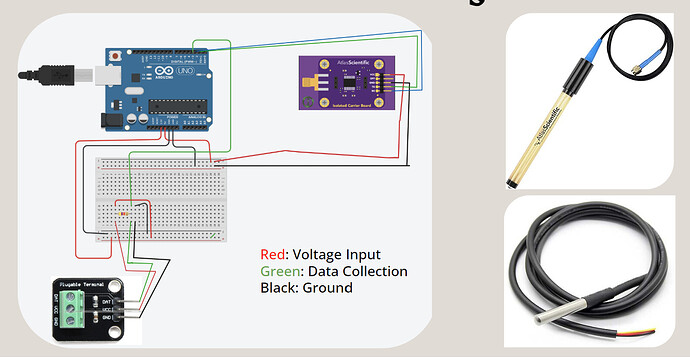Hello everyone,
I currently have the setup shown below using an Arduino Uno, Atlas Scientific ORP probe, DS18B20 temperature probe, and an Atlas Scientific isolated carrier board. With the current code below, we are able to see readings from both probes in the serial monitor (although for every five temperature readings we receive one ORP reading). However, the ORP readings stop outputting to the monitor after 13 times while the temperature continues to output. Our main objective is to have both probes constantly outputting to the serial monitor without need for two separate codes. Tinkering with the Serial.readstringuntil() command doesn't appear to have an effect. Thanks!
Code:
#include <OneWire.h>
#include <DallasTemperature.h>
// Data wire is plugged into pin 4 on the Arduino
#define ONE_WIRE_BUS 4
// Setup a oneWire instance to communicate with any OneWire devices
// (not just Maxim/Dallas temperature ICs)
OneWire oneWire(ONE_WIRE_BUS);
// Pass our oneWire reference to Dallas Temperature.
DallasTemperature sensors(&oneWire);
#include <SoftwareSerial.h> //we have to include the SoftwareSerial library, or else we can't use it
#define rx 2 //define what pin rx is going to be
#define tx 3 //define what pin tx is going to be
SoftwareSerial myserial(rx, tx); //define how the soft serial port is going to work
String inputstring = ""; //a string to hold incoming data from the PC
String sensorstring = ""; //a string to hold the data from the Atlas Scientific product
boolean input_string_complete = false; //have we received all the data from the PC
boolean sensor_string_complete = true; //have we received all the data from the Atlas Scientific product
float ORP;
//used to hold a floating point number that is the ORP
void setup()
{
// start serial portf
// Serial.begin(9600);
// Serial.println("Dallas Temperature IC Control Library Demo");
Serial.begin(9600); //set baud rate for the hardware serial port_0 to 9600
myserial.begin(9600); //set baud rate for the software serial port to 9600
inputstring.reserve(10); //set aside some bytes for receiving data from the PC
sensorstring.reserve(30); //set aside some bytes for receiving data from Atlas Scientific product
// Start up the library
sensors.begin();
}
void serialEvent() { //if the hardware serial port_0 receives a char
inputstring = Serial.readStringUntil(13); //read the string until we see a <CR>
input_string_complete = true; //set the flag used to tell if we have received a completed string from the PC
}
void loop()
{
// call sensors.requestTemperatures() to issue a global temperature
// request to all devices on the bus
Serial.print(" Requesting temperatures...");
sensors.requestTemperatures(); // Send the command to get temperatures
Serial.println("DONE");
Serial.print("Temperature is: ");
Serial.print(sensors.getTempCByIndex(0)); // Why "byIndex"?
// You can have more than one IC on the same bus.
// 0 refers to the first IC on the wire
if (input_string_complete == true) { //if a string from the PC has been received in its entirety
myserial.print(inputstring); //send that string to the Atlas Scientific product
myserial.print('\r'); //add a <CR> to the end of the string
inputstring = ""; //clear the string
input_string_complete = false; //reset the flag used to tell if we have received a completed string from the PC
}
if (myserial.available() > 0) { //if we see that the Atlas Scientific product has sent a character
char inchar = (char)myserial.read(); //get the char we just received
sensorstring += inchar; //add the char to the var called sensorstring
if (inchar == '\r') { //if the incoming character is a <CR>
sensor_string_complete = true; //set the flag
}
}
if (sensor_string_complete == true) { //if a string from the Atlas Scientific product has been received in its entirety
Serial.println(" ORP probe " + sensorstring); //send that string to the PC's serial monitor
//uncomment this section to see how to convert the ORP reading from a string to a float
if (isdigit(sensorstring[0])) { //if the first character in the string is a digit
ORP = sensorstring.toFloat(); //convert the string to a floating point number so it can be evaluated by the Arduino
if (ORP >= 500.0) { //if the ORP is greater than or equal to 500
Serial.println("high"); //print "high" this is demonstrating that the Arduino is evaluating the ORP as a number and not as a string
}
if (ORP <= 499.9) { //if the ORP is less than or equal to 499.9
Serial.println("low"); //print "low" this is demonstrating that the Arduino is evaluating the ORP as a number and not as a string
}
}
*/
sensorstring = ""; //clear the string
sensor_string_complete = false; //reset the flag used to tell if we have received a completed string from the Atlas Scientific product
delay(100);
}
}
